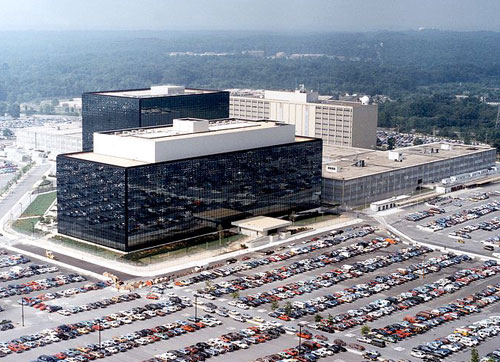Judge Orders NSA to Stop Collecting Telephone Metadata
Federal judge overturns NSA's legal argument for bulk collection of domestic phone records, but stays order to end program pending appeal.
Here at Tom’s Guide our expert editors are committed to bringing you the best news, reviews and guides to help you stay informed and ahead of the curve!
You are now subscribed
Your newsletter sign-up was successful
Want to add more newsletters?

Daily (Mon-Sun)
Tom's Guide Daily
Sign up to get the latest updates on all of your favorite content! From cutting-edge tech news and the hottest streaming buzz to unbeatable deals on the best products and in-depth reviews, we’ve got you covered.

Weekly on Thursday
Tom's AI Guide
Be AI savvy with your weekly newsletter summing up all the biggest AI news you need to know. Plus, analysis from our AI editor and tips on how to use the latest AI tools!

Weekly on Friday
Tom's iGuide
Unlock the vast world of Apple news straight to your inbox. With coverage on everything from exciting product launches to essential software updates, this is your go-to source for the latest updates on all the best Apple content.

Weekly on Monday
Tom's Streaming Guide
Our weekly newsletter is expertly crafted to immerse you in the world of streaming. Stay updated on the latest releases and our top recommendations across your favorite streaming platforms.
Join the club
Get full access to premium articles, exclusive features and a growing list of member rewards.

A federal judge today (Dec. 16) knocked out the legal underpinnings supporting the National Security Agency's (NSA) bulk collection of domestic telephone metadata, ordering that the government end the program.
"I cannot imagine a more indiscriminate and arbitrary invasion than this systematic and high-tech collection and retention of personal data on virtually every single citizen for purposes of querying it and analyzing it without judicial approval," Justice Richard Leon wrote in his memorandum granting a preliminary injunction against the NSA.
However, Justice Leon, of the U.S. District Court for the District of Columbia, commonly known as the D.C. Circuit Court, stayed his order pending a government appeal.
But he warned that "should my ruling be upheld, this order will go into effect forthwith."
MORE: '60 Minutes' BIOS Plot May Be NSA Invention
Leon's 68-page ruling finds that the Supreme Court's 1979 ruling in Smith v. Maryland, which upheld the right of police to place a "pen register" on a telephone line without a warrant, is not sufficient justification for the NSA's daily collection of millions of telephone records.
A pen register is a simple device that records all the telephone numbers sending and receiving calls from a telephone line.
Get instant access to breaking news, the hottest reviews, great deals and helpful tips.
In Smith v. Maryland, investigators had placed a pen register in the offices of a telephone company to track a specific line.
According to a piece published in this week's New Yorker magazine, in 2004, then-NSA Director Gen. Michael Hayden persuaded Foreign Intelligence Surveillance Court Judge Colleen Kollar-Kotelly to approve the collection of bulk metadata on the basis of the Smith ruling. (Kollar-Kotelly is now a colleague of Leon's on the D.C. Circuit Court bench.)
Today, Leon found that argument long out of date.
"When do present-day circumstances — the evolutions in the government's surveillance capabilities, citizens' phone habits and the relationship between the NSA and telecom companies — become so thoroughly unlike those considered by the Supreme Court 34 years ago that a precedent like Smith simply does not apply?" Leon asked.
"The answer, unfortunately for the Government," he wrote, "is now."
MORE: Can You Hide Anything From the NSA?
Leon's memorandum responds to motions for preliminary injunctions in two lawsuits filed by legal gadfly Larry Klayman, a conservative activist and lawyer who has repeatedly sued the federal government over the past 20 years.
Klayman's first lawsuit against the NSA, which Leon refers to as Klayman I, was filed June 6 of this year, the day after the first NSA documents leaked by Edward Snowden were published in The Guardian and The Washington Post. It seeks to end bulk collection of telephone metadata.
The second lawsuit, or Klayman II, was filed June 12, following the exposure of the NSA's PRISM program, and expanded the grievances to include collection of Internet metadata.
Preliminary injunctions are normally granted when a judge finds that ongoing conduct of one of the parties is harming the other, even before the final ruling is made. Injunctions often indicate how the court will rule.
Klayman had filed the motions for preliminary injunction on the ground that the NSA's continued collection of bulk metadata was causing harm to himself and four fellow plaintiffs.
Leon excluded Internet metadata from his ruling because Director of National Intelligence James Clapper had told Sen. Ron Wyden (D-Ore.) that domestic collection of Internet metadata had ended in 2011 "and therefore there is no possible ongoing harm that could be remedied by injunctive relief."
Regarding the collection of Internet metadata overseas, Leon ruled that it could not be shown to have targeted any of the plaintiffs' communications.
But, he wrote, "the court concludes that plaintiffs have standing to challenge the constitutionality of the government's bulk collection and querying of phone record metadata ... and that they will suffer irreparable harm absent preliminary injunctive relief."
MORE: How the NSA Gets Into Your Smartphones
Leon furthermore questioned whether the collection of bulk metadata was effective at all.
"The government does not cite a single instance," he wrote, "in which analysis of the NSA's bulk metadata collection actually stopped an imminent attack, or otherwise aided the government in achieving any objective that was time-sensitive in nature."
Nevertheless, "in light of the significant national security interests at stake in this case and the novelty of the constitutional issues," Leon wrote, "I will stay my order pending appeal."
But, he added, "I fully expect that during the appellate process, which will consume at least the next six months, the government will take whatever steps necessary to prepare itself to comply with this order when, and if, it is upheld.
"Suffice it to say," Justice Leon said in conclusion, "requesting further time to comply with this order months from now will not be well received and could result in collateral sanctions."
Follow Paul Wagenseil at @snd_wagenseil. Follow Tom's Guide at @tomsguide, on Facebook and on Google+.

Paul Wagenseil is a senior editor at Tom's Guide focused on security and privacy. He has also been a dishwasher, fry cook, long-haul driver, code monkey and video editor. He's been rooting around in the information-security space for more than 15 years at FoxNews.com, SecurityNewsDaily, TechNewsDaily and Tom's Guide, has presented talks at the ShmooCon, DerbyCon and BSides Las Vegas hacker conferences, shown up in random TV news spots and even moderated a panel discussion at the CEDIA home-technology conference. You can follow his rants on Twitter at @snd_wagenseil.
-
HEXiT the NSA replied with. its his opinion we go by the DOJ... so they will ignor it and carry on acting beyond there remit. i would love to see this also happen in the uk as well as other countries that are doing this kind of trawling.Reply
but even if they do pass laws saying you cant spy on your own indiscriminately they will get there partner agencies to do it for them and with the use of carefully worded semantic arguments they will claim it to be legal... -
uuicked It's stupid and dangerous to not allow the NSA to continue with business as usual. You are all safer in ways we'll never know. There isn't some person actually listening to the 99.9% of American calls which mean nothing. They are using a database to query any and all key words that actually are sensitive like we've all known about since we were children. Remember the childhood tale about how you couldn't say bomb and president on the telephone or the government would flag you? We knew they listened then, why pretend we don't know they still listen? They aren't out to bully GMO quacks, the NSA wants to stop real criminals... and if you are one, I hope they catch you. Ensuring bad things happen to bad people :)Reply -
eodeo "It's like NSA cares. They are above judiciary system, whether we want it or not. "Reply
Its easy to forget that NSA is just a dog doing its masters bidding. Its not their fault or initiative that caused the current situation. It's always the politicians- the kind democratic people elect to rule in their name, that are ultimately responsible for formation and execution of the evil spying or any other secret government plans.
Only transparency will prevent formation of future evils like this one. -
spectrewind @uuicked...Reply
It's even more dangerous to NOT know what the freedoms (not rights) laid out in the U.S. constitution are. And the constitution is NOT a living document, as the lefties would have it.
Freedom isn't free. Every generation, or two, or three, it has to be bought... Again. Blood/lives being the price. The next payment is *not far in the future.
"Then they came for me--and there was no one left to speak for me."
Martin Niemoller...
Look it up... Those times are slowly approaching, some aspects quicker than others. Open your eyes. -
JOSHSKORN The NSA should open its own dating site. I'm sure with it's superior ability to spy on people, its Matchmaking algorithms would find one's perfect match.Reply
 Club Benefits
Club Benefits










